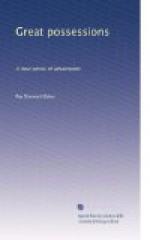The house seemed an inconceivable distance away, and the only real thing in the world the gnawing emptiness under my belt. And I was wet to my knees, and the tangled huckleberry bashes and sheep laurel and hardback I had passed through so joyously a short time before now clung heavily about my legs as I struggled through them. And the sun was hot and high—and there were innumerable small, black buzzing flies.
To cap the climax, whom should I meet as I was crossing the fence into the lower land but my friend Horace, He had been out early looking for a cow that had dropped her calf in the woods, and was now driving them slowly up the lane, the cow a true pattern of solicitous motherhood, the calf a true pattern of youth, dashing about upon uncertain legs.
“Takin’ the air, David?”
I amuse Horace. Horace is an important man in this community. He has big, solid barns, and money in the bank, and a reputation for hardheadedness. He is also known as a “driver”; and has had sore trouble with a favourite son. He believes in “goin’ it slow” and “playin’ safe,” and he is convinced that “ye can’t change human nature.”
His question came to me with a kind of shock. I imagined with a vividness impossible to describe what Horace would think if I answered him squarely and honestly, if I were to say:
“I’ve been down in the marshes following my nose—enjoying the thorn apples and the wild geraniums, talking with a woodpecker and reporting the morning news of the woods for an imaginary newspaper.”
I was hungry, and in a mood to smile at myself anyway (good-humouredly and forgivingly as we always smile at ourselves!) before I met Horace, and the flashing vision I had of Horace’s dry, superior smile finished me. Was there really anything in this world but cows and calves, and great solid barns, and oatcrops, and cash in the bank?
“Been in the brook?” asked Horace, observing my wet legs.
Talk about the courage to face cannon and Cossacks! It is nothing to the courage required to speak aloud in broad daylight of the finest things we have in us! I was not equal to it.
“Oh, I’ve been down for a tramp in the marsh,” I said, trying to put him off.
But Horace is a Yankee of the Yankees and loves nothing better than to chase his friends into corners with questions, and leave them ultimately with the impression that they are somehow less sound, sensible, practical, than he is and he usually proves it, not because he is right, but because he is sure, and in a world of shadowy halt-beliefs and half-believers he is without doubts.
“What ye find down there?” asked Horace.
“Oh, I was just looking around to see how the spring was coming on.”
“Hm-m,” said Horace, eloquently, and when I did not reply, he continued, “Often git out in the morning as early as this?”
“Yes,” I said, “often.”
“And do you find things any different now from what they would be later in the day?”




